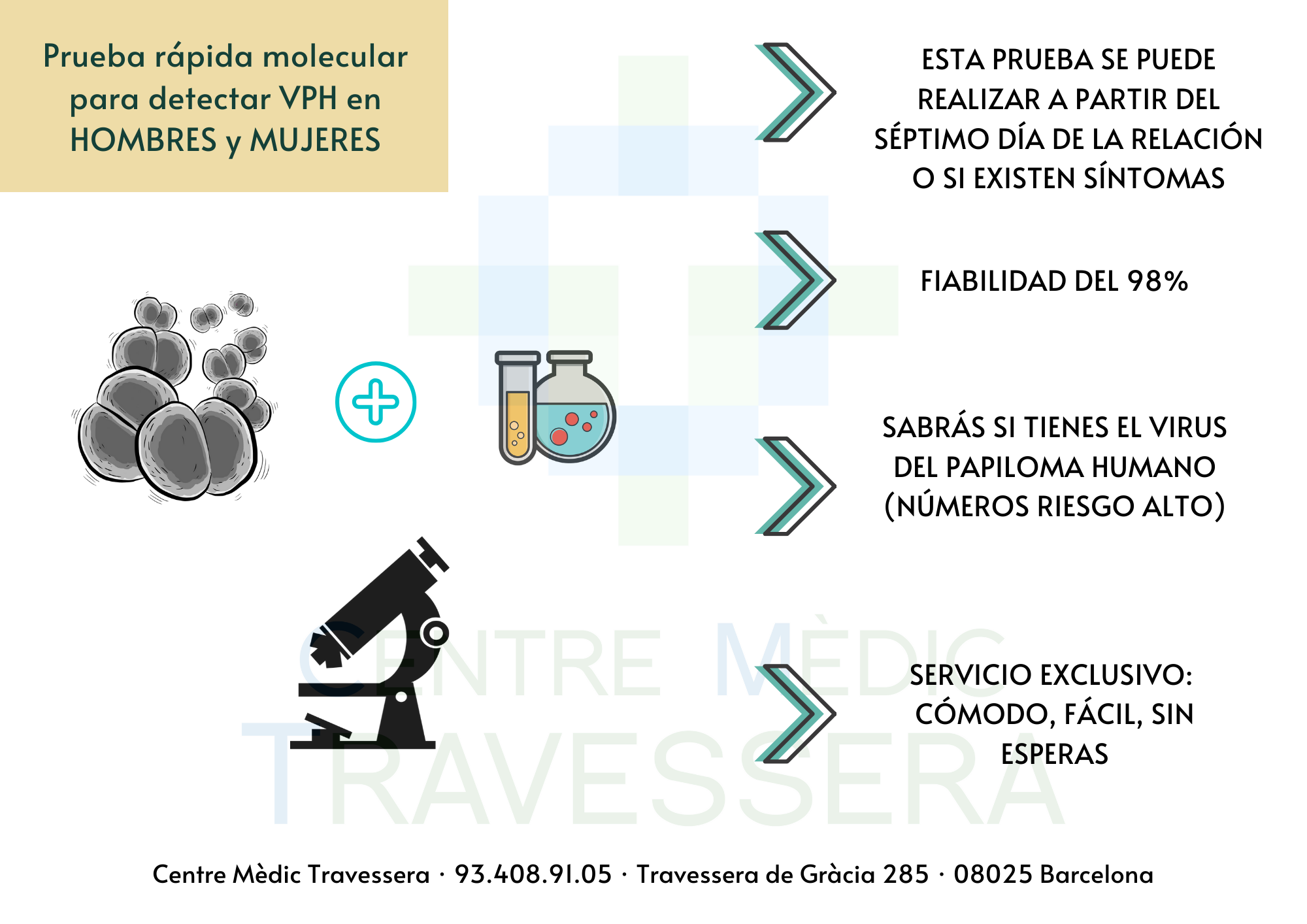HUMAN PAPILLOMA VIRUS (HPV)
Get tested for the Human Papillomavirus (HPV):
This test is done by smearing the genital area.
Currently we already have the rapid test for this type of virus, so that the results are obtained in 60 minutes.
Call Us at 93 408 91 05
Until now, we had the possibility of performing the PCR and reverse hybridization test (detection and genotype) where only contact with high-risk HPV types was detected. Currently we already have the possibility of performing the PCR that will detect contact with low, medium and high risk HPV.
It is important that you bear in mind that the sample is taken from the cells that are shed from the genital area, so you should avoid the use of soaps or products that can eliminate them, as well as contact with water, 6 hours before performing the test. test approximately.
Our doctor will solve any doubts you may have about a possible contagion or symptoms that you present.
Do not hesitate to take the test and ensure your health and that of those around you.
Total confidentiality.

vph, papilloma, papilloma virus, vph test
What is papillomavirus and what are its symptoms?
- What is HPV? The human papillomavirus is a sexually transmitted infection. It is the most common of the so-called STIs (Sexually Transmitted Infections).
- How does it manifest? Most of the time, HPV infection does not produce any symptoms or discomfort and the person is not aware that they have this infection, however, they can transmit it to other people. Other times the infection can reveal itself in two ways: warts or warts, which are associated with low-risk HPV, or dysplasias (cancerous lesions), which are associated with high-risk HPV and appear on the cervix in women and in the rectum in men. These second manifestations, which arise in the minority of cases, are the ones that can cause problems.
- How is contagion produced? Always for sexual intercourse (oral, anal or vaginal sex) with or without penetration. It is not related to being immunosuppressed, but the immune system can clear the virus when it is already infected. This virus is not transmitted through fluids such as blood or semen. Anyone infected can transmit the virus.
- How many percent of the population suffers from this disease? It is estimated that almost 75% of the sexually active population will be infected throughout their lives, but this does not mean that everyone will develop the disease. Only a small proportion of people infected with HPV develop disease in the form of genital warts or dysplasias.
- Why are STIs on the rise today? Due to various circumstances: early initiation of sexual relations, greater number of sexual partners, use of recreational drugs or alcohol and having unprotected sexual relations under the effect of these drugs, since the notion of risk is completely lost.
- In which cases can high-risk HPV lead to cancer? Although in a small percentage, high-risk types that persist for years can lead to cervical or anal cancer. But being infected with HPV does not mean that cancer will develop, far from it. Do not be alarmist: suffering from the virus in most cases does not cause disease.
- What preventive measures should be taken? The best prevention is vaccination. There are currently two that act against the most common types of HPV, and new formulas with broader coverage for high-risk types are being studied. The ideal is to get vaccinated in adolescence, when you are not yet sexually active. Another very effective prevention measure is cervical cytology in women and anal cytology in people who practice anal sex, especially in homosexual men.
- Can condom use prevent infection? The condom reduces the risk, but does not prevent infection as effectively as in other STIs.
- What is the most effective treatment for HPV? There is no treatment to eliminate the virus, but there is treatment against the diseases that it can cause. There are different techniques to remove warts. For dysplasias (cancerous lesions), treatment requires surgery.
Source: El Mundo 08/07/2014
High risk HPV test
Complete HPV Test
Low, Medium, High risk


